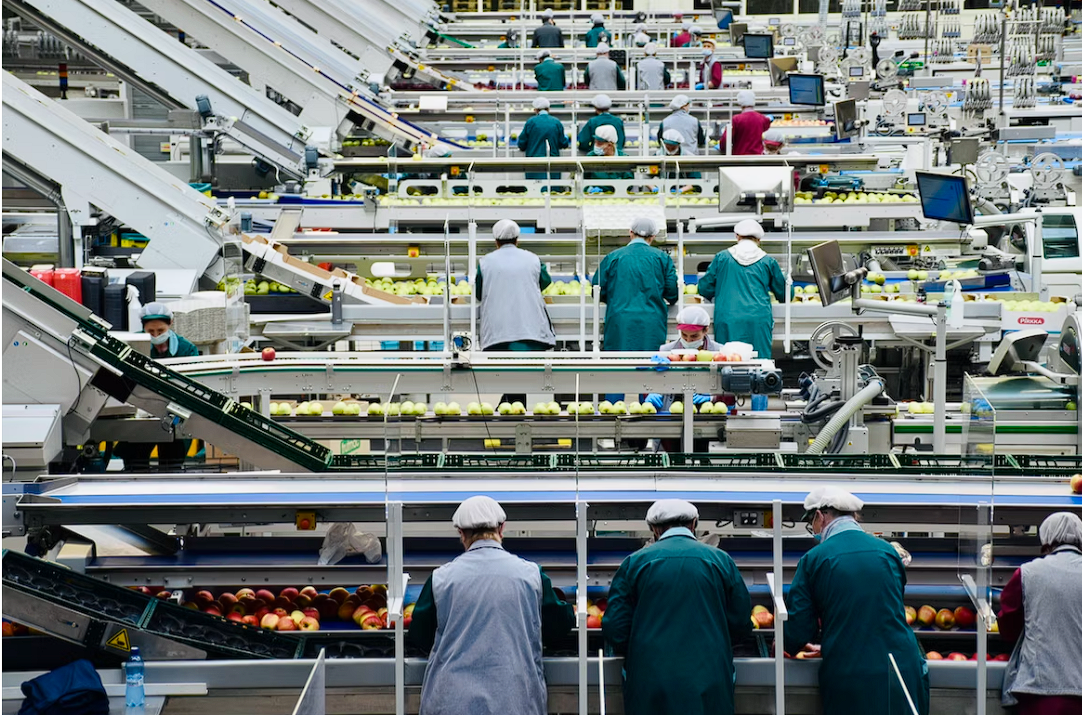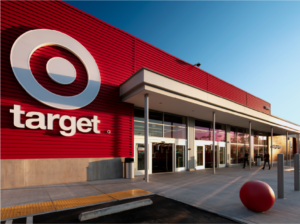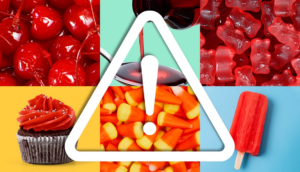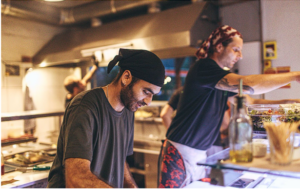- Food Startup Funding: Do you need investors to build a successful food or beverage business? - February 29, 2024
- Explaining Food Certifications & Labeling: Organing, Non-GMO, Halal, Kosher, & More! - February 29, 2024
- Explaining the Meaning of MOQ - February 29, 2024
Turnkey Manufacturing: How Turnkey Services Can Support Your Food & Beverage Business
If you’re looking to scale your food and beverage startup, choosing the manufacturing method is likely top of mind. Instead of managing everything in-house, turnkey manufacturing allows you to outsource your project to external design and manufacturing teams. Whether you’re manufacturing protein bars or frozen foods, turnkey services mean you can come to a manufacturer with an idea–and end with your products on the shelves.
This article will review the turnkey manufacturing processes, benefits, and potential limitations of this food and beverage manufacturing service.
What is Turnkey Manufacturing?
In turnkey manufacturing, a contract manufacturer (co-man) can assume some or all responsibility for the entire manufacturing process of a product on behalf of their client, from development to production and finally to delivery.
As the customer and brand owner, you are typically responsible for providing the specifications, requirements, and vision for the process. Following these specifications, the turnkey co-man handles some or all aspects of production, including design, engineering, procurement of raw materials, manufacturing, quality control, packaging, and logistics.
Outsourcing the entire manufacturing process to a specialized manufacturer reduces the burden of managing the production process, freeing you up to focus on other aspects of the business, such as marketing, branding, sales, and distribution.
What is the Difference Between Turnkey Manufacturing and Contract Manufacturing?
Another great option is contract manufacturing, a process where you outsource a specific manufacturing process or the production of a particular product to a third-party manufacturing company–instead of the entire process.
A contract manufacturer, or co-man, is a food production facility that produces food and/or beverage products on contract for other brands (their clients). They make the products to the exact specification of the brand-owned formula.
Contract manufacturers can also be co-packers, which means they not only manufacture your product, but package it so it’s ready to sell at retail, wholesale, or direct-to-consumers. Often, smaller brands will want to find a contract manufacturer that can both produce and package their products.
Co-packers will receive your finished product either directly from you or your co-manufacturer. If they’re your co-manufacturer as well, they might receive raw ingredients, produce your food or beverage, and then package it so it’s ready for sale.
Many contract manufacturers offer turnkey services, but you can also partner with a co-packer for just some portion of the job.
Turnkey Manufacturing vs Tolling
The main distinction between turnkey manufacturing and tolling is that tolling requires the client to provide all the raw materials necessary for production.
Although this method calls for more coordination between the manufacturer and client, it gives brands more control over the quality of raw material being used, the number of products produced at a given time, and typically any intellectual property rights associated with the product.
Find Your Next Turnkey Manufacturing Partner
Turnkey Manufacturing Services for the Food Industry
1. R&D
Research and development (R&D) in food manufacturing is the process of creating new food products or further developing existing products. While each co-man may facilitate this differently, R&D is a multistep process that takes new product concepts from ideation to a viable product and often requires collaboration between the co-man and the customer.
In the initial stages, market, consumer, and competitor analyses are conducted to inspire new ideas for food products or find ways to enhance existing goods. Once the R&D team selects an idea to build on, they move into concept development. This step involves fleshing out the commercial details surrounding the potential food product such as its unique features, target market, positioning, and potential benefits.
This is followed by an assessment to determine the feasibility of the food or beverage, taking into consideration factors like technology and equipment needs, ingredient sourcing, costs, regulatory barriers, and potential risks.
If feasibility checks out, initial samples of the new or enhanced product are made. This typically takes several rounds of experimentation with formulas to reach the desired result.
Prototypes then undergo testing from sensory evaluations (taste, texture, appearance, and overall acceptability) to nutritional analysis, stability testing, and shelf-life studies. Based on these evaluations, iterative tweaks and improvements are made to amend any issues. Finally, the product can be ramped up to full-scale production.
2. Ingredient Sourcing
Ingredient sourcing is a critical step in food production since it plays a major role in determining the quality of the final product. With turnkey manufacturing, identifying and procuring the best raw materials and or components needed for your product is all done by your manufacturing partner.
There is a sizeable amount of work that goes into this part of the food production process, including:
- Identifying the best suppliers
- Monitoring quality, price, and lead time
- Negotiating contracts and terms with suppliers
- Managing ongoing relationships with the suppliers to ensure timely delivery of materials and consistent quality
To prevent bad batches and low-quality products, it’s important to work with a turnkey manufacturer that sources from raw food producers that are appropriately certified and that have strict testing ranges for their materials.
3. Manufacturing
Manufacturing encompasses the entire process wherein your product is made via a predefined set of processes and equipment. There are as many unique processes as there are unique products, and turnkey manufacturers provide the proper supply chain services, facilities, equipment, processing, and packaging capabilities to manufacture specific products for clients.
For example, if you’re manufacturing a soda product, the entire clarification, ingredient mixing, carbonation, and packaging process would be handled by your turnkey partner.
However, all manufacturers are different and offer limited sets of unique product manufacturing capabilities.
So if you’re a baked goods brand looking for a manufacturer to produce gluten-free cookies, you’ll need to find one that is certified to make gluten-free products in their facilities. The same goes for organic, kosher, vegan, or products with any other dietary restrictions.
Find Your Perfect Manufacturing Partner
4. Product Testing
Product testing is a vital step in ensuring customer safety as well as product quality and consistency. Testing may be done in-house by the manufacturing team or outsourced by your turnkey team to a third-party testing service.
Product testing happens throughout various stages of the production process and can include:
- Nutritional analysis
- Analytical chemistry testing
- Sensory testing
- Microbiology testing
- Packaging quality testing
Regular testing helps detect contamination or inconsistencies and allows businesses to identify and address issues quickly, protecting consumers and the company’s reputation. As a food brand, it’s especially important to vet potential partners to find a manufacturer with product testing processes that adhere to local, national, and international regulations.
5. Packaging
The packaging process in turnkey manufacturing involves everything from visual appeal to functional design. From the look of your label to the proper sealing and protection of your final product, there’s a wide variety of packaging methods your product may require based on its size, shape, durability, and contents:
- Vertical and horizontal form, fill, and sealing
- Individual and multi-pack wrappers and over-wrapped trays
- Heat seal and cold seal
- Rigid and semi-rigid bowl and tray packaging
- Flat and stand-up packaging
- Hot pack and cold pack
- Bottling (glass, plastic)
- Canning
- Boxing, and packaging bag-in-boxes
- Cartons
- Dual and multiple-compartment pouches
- Re-packing
- Shrink sleeve and cut & stack labeling
- Carbonation and nitrogen dosing
- Skin packaging
- Map packaging
- Wet packing and dry packing
By utilizing appropriate packaging materials and processes, manufacturers can reduce the risk of damage, maintain their brand’s reputation for reliable, quality products, and support branding.
Many turnkey manufacturers offer design and testing services to help develop labeling and packaging that not only represents your brand well but guarantees your products make their way through the delivery environment in top condition.
6. Quality Control & Assurance
Quality control and quality assurance processes are designed to promote and prioritize consistent quality and safety in food products. These processes involve auditing the procedures, equipment, facilities, and raw ingredients that go into creating finished food products.
Albeit extensive, these measures are essential to avoid foodborne illness or product contamination, ensure ingredient quality, and maintain adherence to safety and quality regulations. Turnkey manufacturers keep accurate records of quality checks during the entire process to support quick identification and issue resolutions.
By implementing effective quality control and assurance processes, manufacturers can reduce the risk of product issues, improve customer satisfaction, and again, maintain your brand’s reputation for reliable, quality products.
7. Warehousing & Shipping
Manufacturers offer inventory management by providing warehousing facilities where your products, and all the materials that go into making them, are stored.
Efficient warehousing–whether dry storage, freezer storage, or refrigerated storage–ensures the finished product is safe and readily available for shipment, reducing lead times and improving the entire production flow.
For instance, manufacturers making frozen meals or products with fresh produce will have the appropriate temperature-controlled facilities with refrigerated and frozen storage units to protect your materials and products from spoiling.
Shipping involves the transportation of finished products from the manufacturing facility to the customer or retailer. Shipping processes may include selecting the appropriate transportation mode, arranging for delivery schedules, and tracking shipments to ensure timely delivery.
Ready to Find Your Perfect Co-packer?
Benefits of Turnkey Manufacturing
Flexible Manufacturing
In comparison to managing all elements of food production yourself, turnkey manufacturing can be more adaptable and responsive to changing customer demands, production requirements, and market conditions.
Since the manufacturer owns the entire process, production is designed to be modular and scalable, allowing manufacturers to quickly adjust production levels or change product configurations in response to changing demand. This approach allows your product to remain competitive in a rapidly changing market, while also empowering your manufacturing partner to meet any evolving needs of your brand.
Improved Quality
While turnkey manufacturing isn’t required for great products, when everything is managed at one facility, quality management is conducted at every part of the process. Instead of you managing production and packaging quality on your own, an experienced team takes this over–helping brands to achieve the best quality result and the happiest customers possible at scale.
Efficient & Cost Effective
When one team is overseeing all logistics with effective, clear communication channels, your brand receives an integrated manufacturing process, from intentional design to smooth delivery. Instead of having to pay separate manufacturers for different parts of your process, an all-in-one approach can be more cost effective (though the initial investment may be higher).
With advanced automation technologies, leaned-out manufacturing processes, and rigorous quality control and assurance strategies, turnkey manufacturers can improve your end result, use of capital, and deliver high-quality products to their customers in an efficient way.
Disadvantages of Turnkey Projects
Larger Initial Investment
Turnkey manufacturing partnerships can require a larger investment to get started since they take over your entire process. Instead of just paying for packaging your product and doing everything else in house, turnkey manufacturers do it all–and are compensated for that.
The initial dollar amount required depends on the complexity of the production system, the size of production, and the type of product being manufactured.
Risk of a Mismatch
The risk of handing over all aspects of your business to another party lies in the possibility of mistakes. If your final product doesn’t turn out as planned because of a miscoordination or miscommunication between the parties involved, you might find yourself in a sticky spot.
A mismatch can also occur if there is a lack of alignment between the customer’s expectations and the manufacturing team’s understanding of those expectations, or even just a poor culture fit.
Thankfully, you can minimize this risk by using PartnerSlate. PartnerSlate’s Project Marketplace matches brands with high-quality production partners from our extensive network of Food & Beverage Manufacturers & Packagers. Food businesses create a detailed project and post it anonymously to the marketplace where qualified manufacturers with the right capabilities can come and show interest in your project. PartnerSlate will get you connected directly and cut the search process down from months to days.
Our goal to align you with the best partners in the business–suited to your most nuanced needs–ensures this sort of risk is avoided.
Service Model: Turnkey vs Tolling in CPG contract manufacturing
As we explore the intricacies of working with contract manufacturers in the CPG industry, it’s essential to understand the distinction between “turnkey” and “tolling” service models. This knowledge will not only streamline your decision-making process but also ensure that your partnership aligns with your brand’s operational goals and market strategy. Let’s delve into these models to discern which path best suits your business needs, whether it’s the comprehensive solution offered by turnkey services or the more hands-on approach characteristic of tolling arrangements.
What are Turnkey and Tolling?
When you begin working with a contract manufacturer, one of the questions that will arise is if you are looking for “turnkey” or “tolling”. These two terms define what are called service models, or ways in which a brand engages with a manufacturer.
Turnkey
This term describes the type of manufacturing relationship a brand has with a co-man, in which the co-man makes the entire product. They will be in charge of ordering the ingredients and packaging and making the product, and you will be billed for the finished product.
This type of relationship favors businesses who have a large number of products or a high volume, and don’t want to manage all of the components.
Advantages
- Streamlined Process: the manufacturer handles the entire production, which often results in a more streamlined and efficient process as they have control over all aspects. This may result in lower costs
- Reduced Complexity: By outsourcing the entire production process to a turnkey service provider, brands can reduce the complexity and burden of managing multiple suppliers and logistics, and focus on the brand itself.
- Potential lower COG’s (cost of goods) by tapping into manufacturer’s buying powder
- More direct view of final pricing: you’ll see upfront what your price is, rather than
Disadvantages:
- Cost: Turnkey services may come at a higher cost compared to other service models. Food manufacturers need to consider the added expenses of outsourcing the entire production process to a single provider.
- Limited Control: With a turnkey service model, the food manufacturer relinquishes some control over the production process. They may have limited visibility into specific aspects of production, which can be a disadvantage for those who prefer more hands-on involvement.
- Dependency: Relying on a turnkey service provider means the food manufacturer becomes dependent on their capabilities and performance. Any shortcomings or delays from the service provider can impact the manufacturer’s ability to meet deadlines and fulfill customer orders.
Tolling
This term describes the type of manufacturing relationship a brand has with a co-man, in which the brand is in charge of purchasing the ingredients & packaging, and sending it to the co-man. The co-man will manufacture the product, and will charge you for the use of their machines and their labor.
This type of relationship favors businesses who are looking to produce smaller quantities of products, or on an as-needed basis.
Advantages:
- Cost Efficiency: With a tolling service model, the food manufacturer only pays for specific processing or manufacturing services provided by the toller. This can be cost-effective, especially for smaller manufacturers who may not have the resources to invest in their own production facilities or equipment.
- Control: you as the brand have more control over the raw materials being used, and you retain ownership over the intellectual property related to the finished product.
- Flexibility: Tolling allows food manufacturers to have more flexibility in their production capabilities. They can leverage the toller’s expertise and equipment for specific processes without committing to long-term investments
- Focus on Core Competencies: By outsourcing certain aspects of production to a tolling service provider, food manufacturers can focus on their core competencies, such as product development, marketing, and sales.
Disadvantages:
- Coordination: as the co-man is only in charge of the actual manufacturing, you as the brand have a lot more to coordinate. Ingredients and packaging need to arrive before production, testing may need to occur after production, and distribution needs to align with production dates.
Find the Right Turnkey Manufacturing Partner For Your Food Business
When scaling your product, it takes time, energy, and investment to find the perfect manufacturing partner. That’s where Partnerslate comes in.
Whether or not turnkey manufacturing feels like the best approach for your brand’s next chapter, you can trust in PartnerSlate to find a manufacturer suited to your needs. Team with us to team you with the perfect manufacturing partner, so you can spend your time on the aspects of the business that brought you here.



